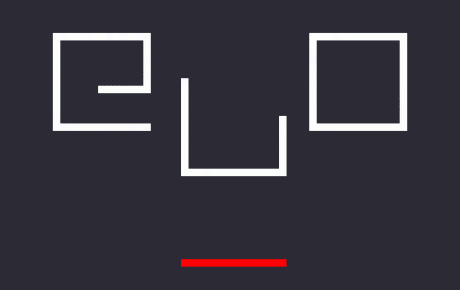“L’où” by Philippe Bootz published first in 1990 in alire 3, is a work of animated poetry that has no images, that has no sounds, but that demands a strong engagement from the viewer only with the words on the screen. Being a transitory text where the text changes without interaction of the viewer, one sees firstly the word “que” and groups of letters, “aill” and “vaill” , that move, but that do not make complete words. Then, the letters form “vaill/que/aille” perhaps referencing the commonly used French phrase “vaille que vaille”, creating a syntactic animation where the text is in tension between the reading (and interpretation) of the text on the space of the screen and the reading of the text within the transitory development and evolution of the work. In a similar manner, the title follows this motif of a phrase that is not complete, but that represents something more important than the words alone. This work evokes the theme of shipwreck that is supported by a lexicon of words pertaining to water, or the ocean, and to destruction. The lyrical subject uses words like: “fluid”, “boiling”, “fog”, “coasts”, “rhythm of water”, and “reefs”, but also words like “tatters”, and “fragments”. The work follows the theme of destruction of the sea, and, one could say, “tells a story” of a ship lost at sea. From the text: l’errance de la voile/l’aller, le dire écueil l’arrime et le dire et rompt et l’arrime et l’errance il rompt comme du pain/pâte/pas et façonne jusqu’au rythme de l’eau The title “L’où” represents a phrase that is not complete but that shows the relationship between words and emptiness. The title appears in the work as: L’_____________où______________ The space between the two words suggests that there are aspects that lack. The words them-selves could represent the fragments that float in the emptiness of the sea, or the reef that broke the flat surface of the sea and caused the destruction. This theme of shipwreck is a reference to an idea presented in the book UN COUP DE DÉS JAMAIS N‘ABOLIRA LE HASARD by Stéphane Mallarmé. According to Mallarmé, poems are made of thoughts put onto a page. The words float in the space and create a relationship between the fragments of the thoughts and the emptiness that surrounds them. Like a boat completely destroyed by the sea, one seas the same fragments, the tatters, that float in the emptiness. Therefore, a poem is the result of a collision between a thought and the page that results in a scattering of words.
L'où
Source Database:
ELMCIP
Source Entry URL:
Source Entry OAI-PMH Identifier:
oai:elmcip.net:9733
Source Entry Language(s):
English
Description(s):







